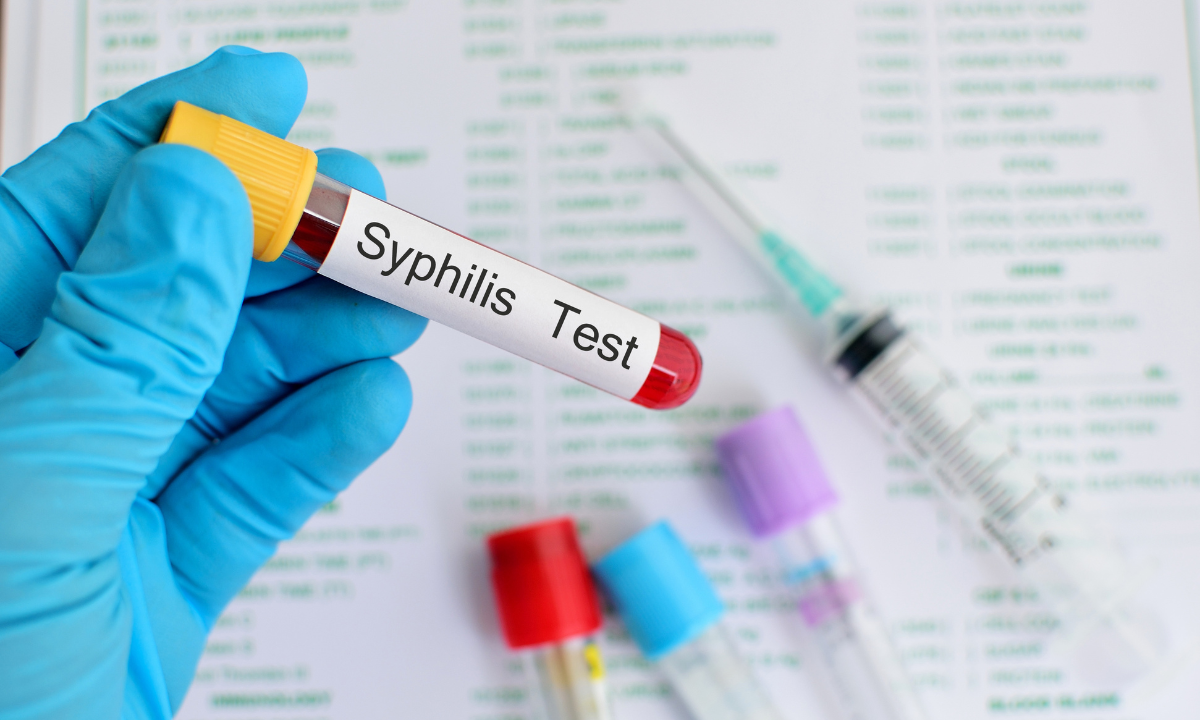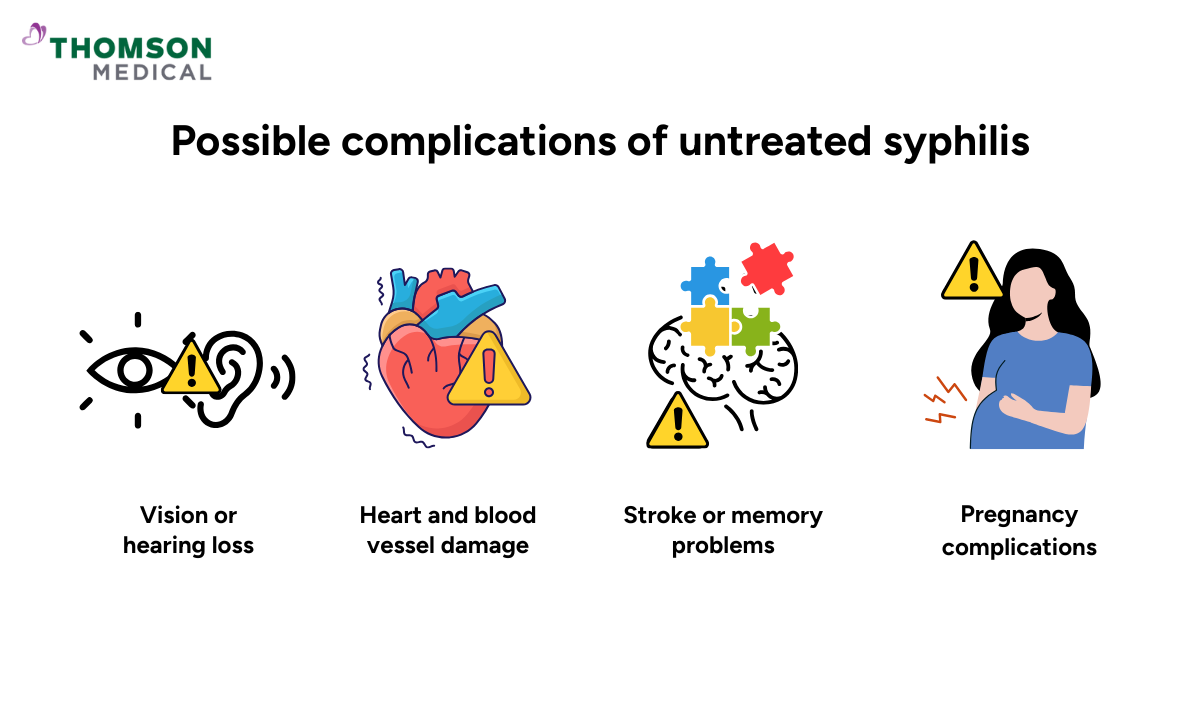Although sexually transmitted infections (STIs) can be worrying, many of them, including syphilis, are completely treatable when detected early. Syphilis can affect any individual, regardless of their age or background. The tricky part is that it can stay hidden for years, slowly harming the body without showing clear symptoms.
Knowing how syphilis spreads and what symptoms to look for can help to protect both your health and your partner's. With proper care and testing, syphilis can be fully cured and prevented from recurring.
What is syphilis?

Syphilis is a bacterial infection that is transmitted through sexual contact. It’s caused by a bacterium called Treponema pallidum, which spreads mainly through direct contact with a syphilis sore during vaginal, anal, or oral sex.
These sores usually appear on your genitals, anus, or mouth and are often painless, which is why many people don't realise they have this sexually transmitted infection. Without treatment, the infection can lead to severe health problems affecting major organs such as your brain, heart, and nervous system.
What are the symptoms of syphilis?
Syphilis is sometimes called the "great imitator" because its symptoms can look like other illnesses. Some people may have no visible signs at all, which is why regular STI testing matters so much.
Your symptoms will vary depending on which stage of infection you're in, and these stages change over time.
What are the stages of syphilis?
Syphilis develops through four stages which are primary, secondary, latent, and tertiary. Symptoms change at each stage, and the infection can quietly progress if left untreated.
Primary syphilis
Primary syphilis is the first stage and appears 2-6 weeks after exposure to the bacteria. You may notice a chancre (a small sore) at the spot where the bacteria enter your body, usually on the genitals, anus, or mouth. The sore is usually painless, which makes it easily overlooked.
The lymph nodes (small glands that help fight infection) near the sore may swell slightly. The sore will heal on its own within a few weeks, but that doesn't mean the infection has gone away. Without treatment, syphilis can progress to the next stage.
Secondary syphilis
A few weeks or months after the first sore heals, the infection spreads through your bloodstream and affects other parts of your body. You might experience:
A non-itchy rash, especially on your palms and soles
Fever, tiredness, and sore throat
Patchy hair loss
Swollen glands in your neck or groin (the area between your abdomen and upper thigh)
Wart-like growths called condylomata lata on moist areas like your genitals or mouth
At this stage, syphilis is highly contagious. Even after the rash fades, the infection can stay in your body.
Latent syphilis
In this phase, the infection goes into hiding, and there are no symptoms to see or feel. Your doctor will classify it as either early latent (within one year of infection) or late latent (after one year of infection).
You might feel completely healthy, but the bacteria are still living in your body. During the early latent stage of syphilis, a pregnant woman can pass the infection to their baby. The only way to know for sure if you have syphilis now is by getting a blood test.
Tertiary syphilis
When left untreated for years, syphilis can advance to the tertiary stage, which can harm vital organs. While this stage isn't contagious, it can be life-threatening. Complications may include:
Brain and nerve problems, which can cause memory loss, difficulty moving, or stroke
Heart and blood vessel damage
Gummas (rubbery lumps) that form on your skin or organs
These complications are very serious, but they can be prevented with early detection and treatment. Most people with syphilis are diagnosed and treated long before reaching this stage.
Syphilis is most treatable in its early stages. Schedule an appointment with Thomson Medical today to discuss your symptoms and receive the right tests for early detection and effective treatment.
What causes syphilis?
The infection happens when the bacteria enter your body through small cuts or the thin, moist linings (mucous membranes) in your mouth, anus, or genitals.
The most common way syphilis spreads is through sexual contact with someone who has syphilis sores. In rare cases, syphilis can be transmitted through blood transfusion. A pregnant woman can also pass it to their baby during pregnancy or birth. It's important to know that syphilis doesn't spread through casual contact like hugging, sharing food, or using the same toilet.
Who's at risk of getting syphilis?
Anyone who's sexually active can get syphilis. Your risk may be higher in certain situations, including:
Having unprotected sexual intercourse
Have multiple sexual partners
Having other STIs such as HIV, chlamydia, or gonorrhoea
Routine testing and practising safe sexual intercourse can significantly lower your risk. If any of these situations apply to you, talking to your doctor about regular screening is a good step toward protecting your health.
Our O&G specialists
Loading...
How is syphilis diagnosed?
If you think you may have been exposed to syphilis, your doctor will conduct physical exam and laboratory tests to detect the presence of the bacteria in your body.
Blood tests are the most common way to diagnose syphilis. Your doctor may use:
Non-treponemal tests (like VDRL or RPR) to screen for infection
Treponemal tests to confirm the diagnosis
Other tests may include:
Swab tests from a sore and examined under a microscope
Spinal fluid tests if your doctor suspects the infection has reached your brain or nerves
Doctors usually diagnose syphilis with a blood test, which is reliable even if you don’t show any symptoms.
If you're concerned about possible exposure to syphilis or have noticed any unusual symptoms, schedule a consultation with our specialists at Thomson Medical. We provide discreet, compassionate care to help you understand your test results and receive the right treatment.
How is syphilis treated?
Your doctor will usually treat syphilis with an injection of antibiotics (penicillin G). This is a simple and highly effective treatment if the condition is caught early.
Early-stage infections usually need just one dose
Later stages require several doses over three weeks
If you're allergic to penicillin, your doctor can prescribe alternatives like doxycycline or ceftriaxone, though penicillin remains the most effective option.
After treatment, your doctor will schedule follow-up blood tests to make sure the bacteria are completely gone. You should avoid any sexual contact until your doctor confirms that the infection has fully cleared. It's also important that your sexual partner get tested and treated to prevent reinfection.
What are the possible complications of syphilis?

Without treatment, syphilis can lead to serious health complications over time, affecting your brain, nerves, eyes, heart, or other organs. However, these outcomes are preventable with early care.
If left untreated for many years, possible complications may include:
Vision loss (ocular syphilis)
Hearing loss (otosyphilis)
Neurological problems such as stroke or memory issues (neurosyphilis)
Heart and blood vessel damage (cardiovascular syphilis)
Serious health risks during pregnancy, which can affect your baby (congenital syphilis)
Syphilis can also make it easier to contract or transmit HIV, as sores provide entry points for the virus.
The reassuring part is that these complications are uncommon when syphilis is caught and treated early. Most people who get tested and treated recover completely without any lasting effects.
How can you prevent syphilis?
The best way to protect yourself from syphilis is through safer intercourse practices and regular testing. You can reduce your risk by:
Using condoms or dental dams consistently during vaginal, anal, or oral sex
Getting tested regularly, especially if you have multiple partners
Encouraging partners to get tested as well
If you think you may have been exposed to syphilis, there's a preventive option you can discuss with your doctor. Doxycycline post-exposure prophylaxis (doxy PEP) is an antibiotic that may reduce infection risk when taken within 72 hours of exposure. Your doctor can help you decide if this option is suitable for your situation.
For personalised guidance on STI prevention and testing, schedule your consultation with our specialists at Thomson Medical. We're here to answer your questions in a private, supportive environment.
FAQ
Is syphilis curable?
Yes, syphilis is completely curable with antibiotics, most often penicillin. Early diagnosis and treatment prevent permanent damage to your organs. However, any harm the infection caused before you received treatment cannot be reversed, which is why catching it early matters.
What is the main cause of syphilis?
Syphilis starts when the bacteria Treponema pallidum enters your body through direct contact with an infected person’s sores during sex. It can pass through tiny cuts in the skin or the moist areas of the mouth, genitals, or anus. A pregnant person can also pass it to their baby during pregnancy or childbirth. Once inside, the bacteria multiply and can spread through your blood to other parts of the body if not treated.
How long does it take to cure syphilis?
Most people recover within a few weeks after receiving treatment. For late-stage infections, treatment may take longer, and your doctor will use follow-up blood tests to confirm that the infection has been cleared.
How can you tell if a man has syphilis?
You can't tell just by looking at someone, as symptoms may be mild or completely invisible. A blood test is the only reliable way to know if someone is infected. If you're concerned about a partner's status, the best step is for both of you to get tested.
Can syphilis be transmitted through kissing?
Yes, but it's rare. Syphilis can spread through deep kissing if the infected person has open sores in or around their mouth. However, casual or dry kissing does not transmit the infection.
Can you get syphilis more than once?
Yes, it’s possible to get syphilis again even after successful treatment. Having syphilis once does not make you immune to the infection. If you are exposed to Treponema pallidum again through sexual contact with an infected person, you can become reinfected.
The information provided is intended for general guidance only and should not be considered medical advice. For personalised recommendations and tailored advice based on your personal conditions, consult a specialist at Thomson Medical. Schedule an appointment with Thomson Medical today.
For more information, contact us:
Thomson Specialists (Women's Health)
Thomson Women's Clinic (TWC)
- Novena:
6592 6686 (Call), 8611 8986 (WA) - Bukit Batok:
6569 0668 (Call), 8686 3525 (WA) - Choa Chu Kang:
6893 1227 (Call), 8282 1796 (WA) Jurong:
6262 8588 (Call), 6262 8588 (WA)- Katong (female doctor):
6970 2272 (Call), 8611 9020 (WA) - Punggol:
6243 6843 (Call), 8811 0328 (WA) - Sembawang: 6753 5228
- Sengkang: 6388 8125
- Serangoon (female doctor): 6382 3313
- Tampines: 6857 6266
- Tiong Bahru: 6276 1525
